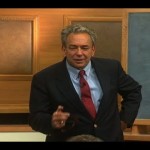Dr. Liam Goligher is Senior Minister of Tenth Church, Philadelphia, PA.
From the Church website:
In the 1970s and 1980, a major battle was underway, often referred to as the Inerrancy of Scripture. Dr. Boice was on the front lines of that battle. Before that, Dr. Barnhouse chose to stay within the Northern Presbyterian Church, as it was called informally. He battled valiantly for the Virgin Birth of Christ, the possibility of miracles, including the resurrection of Christ, and many other core Christian beliefs under attack by the Modernists or Liberals of his day.
Tenth has a long tradition of engaging in such battles and being at the forefront of many of them. It has been a clarion voice in defense of orthodox Christian beliefs as they emerged from the Reformation 500 years ago next year. Documents were drawn up, still cherished today, which define the great truths of the Bible in the terminology of the era in which they were written. So we have the Westminster Confession of Faith and our great catechisms. People died for the truths recorded in them.
Few of us today could explain how Dr. Boice and others drew the battle lines against ‘neo-orthodoxy’ and its watered down view of Scripture in the 1970s. We acknowledge that it was important, but if called upon today to refight that battle, we would have much brushing up to do. That was less than 50 years ago. The battle with the liberals was less than 100 years ago. Few indeed, outside the seminary, would remember the shape of that debate. However, the faith of millions rode on those two battles. And Tenth’s congregation supported their ministers through those fights.
Today, Tenth has again been called to take on a serious challenge to the faith we hold dear. It is our privilege to take up ‘arms’ for our King in a battle far more foundational than those two huge debates of the 20th Century – the Doctrine of God and the full deity of Jesus Christ.
Unfortunately, false teaching has already crept, almost silently, deep inside the very walls of evangelicalism. It was Dr. Goligher who, last June, flipped the switch of the floodlights, revealing these teachings for what they are. Today we would say it went viral.
Also unfortunately, we are being called to pick up a debate that has lain dormant, not for a mere 100 years, but for 1600 years. Obviously, no one at Tenth remembers those battles and the great issues involved. Even the names of those who fought, and sometimes died, for the truth have an unfamiliar ring. That debate seems shrouded in the mists of history. It seems couched in Trinitarian language too abstract for us to comprehend. It seems as if we could never get our heads around such complexity.
We should thank God from our deepest heart that the men who fought the battle in AD 200-400 were men schooled in a world where philosophy – which at that time still included theology – was deemed the supreme field of knowledge. They were up to the task. Today, theology takes a back seat to medicine, all the sciences, history, languages, the arts and even philosophy. But those men defined the debate. We only need to relearn its terms.
Beginning October 9, when starting a series on Hebrews, Dr. Goligher began training us for the battle, which is already raging nationwide. Those have been tough sermons to follow. On the subject of the Trinity, it might be difficult to see the relevance to our daily lives.
Few people would grasp half of what they need to know on the first pass. Listening to them several times, one still finds new angles, new insights into the shape of this debate, new implications for every aspect of our faith.
The trumpet call has sounded. In accordance with Ephesians 6:13-18, let’s polish our spiritual armor. In particular, we need the sword of the Holy Spirit, the word of God as ‘unpacked’ in these sermons. There will be tough times ahead for Bible-proclaiming churches across our country. As so often in the past, many will look to Tenth to lead the charge.
Those who care deeply for the gospel faith, for our Father God, and for our Lord and Savior Jesus Christ will spend time mulling over those sermons on the Trinity. As Dr. Goligher says in one of them:
“Everything is at stake! Everything is at stake!”
11/06/16 11AM Sermon “One Who Is Son” Tenth Presbyterian Church from Tenth Presbyterian Church on Vimeo.
EXTRACT: This word [Son] denotes having the very nature of God and the people of his own day, the Jews of his own day, understood this very clearly. In John 5:18, they complained, you see, “He was calling God his own Father, thus making himself equal with God.” They understood what was going on. And listen to Jesus’ reply. He doesn’t dissuade them. He doesn’t deny it; he doesn’t avoid the subject. In fact, he pursues the subject. He essentially says to them, “That is exactly… You are exactly right. ‘Son of God’ means God.”
VERSES: John 5:26, Psalm 2:7, Colossians 1:15-20, John 1:3, Mark 2:5-10, Luke 7:47-49, John 10:28, John 17:2, Philippians 3:3, Revelation 5:12-13, Matthew 2:2, John 20:28, John 9:38, Matthew 28:8, Hebrews 7:26, Isaiah 52:13, Isaiah 6:1, Philippians 2:9-10, Genesis 1, 1 Timothy 6:16, John 1:9, John 1:18, John 3:31-34, Isaiah 11:2, Colossians 2:2-3, Colossians 1:19, Luke 2:40, Luke 2:42-52, John 16:12-15, John 8:35-36, Hebrews 3:6, Proverbs 3:19, Proverbs 8:22-31, 1 Corinthians 1:30, Ephesians 1:17, John 5:18-26, John 6:46, John 8:38, John 14:7-11, John 4:24, Matthew 28:18, John 17:2, 1 John 4:8, 1 John 4:16, Romans 5:8, 2 Corinthians 5:19, John 17:3,
Series: http://www.tenth.org/resource-library/series-index/hebrews

